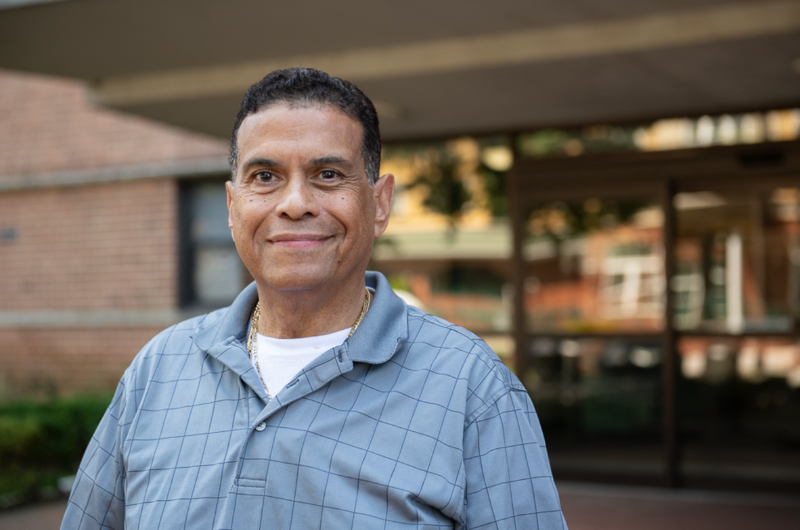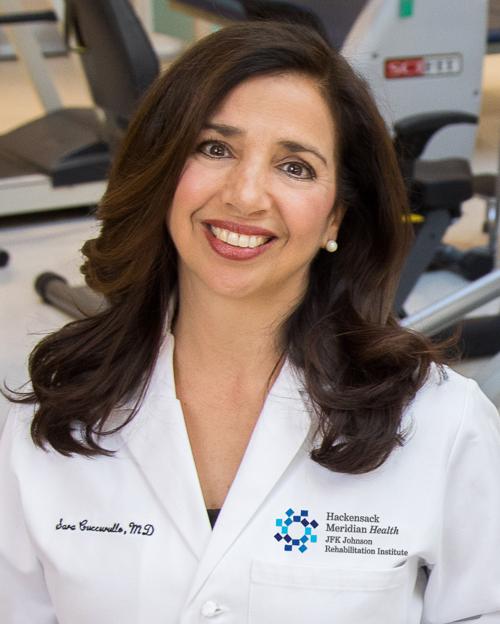New Jersey Man Rebuilds Life with Innovative Stroke Rehabilitation

August 22, 2024
When Luis Villa woke up one morning in early December last year, he was shocked to discover he couldn’t move his right side. “I had no symptoms of anything before this and had been feeling fine,” the 63-year-old says. After calling 911, he was brought to the emergency department at JFK University Medical Center, where he found out he’d survived a stroke.
Still grieving the loss of his beloved wife, Josephine, to liver cancer, Luis now faced his own significant health challenges, struggling to speak or to walk. “I was really grieving, and it felt like one thing after another. And then I had this stroke,” says Luis.
He began inpatient rehabilitation at JFK Johnson Rehabilitation Institute, receiving physical, occupational and speech therapy. There, he learned about the Cardiac Rehabilitation of Stroke Survivors (CROSS) outpatient program and decided to participate.
Changing Stroke Rehabilitation
The CROSS study is part of the JFK Johnson Stroke Recovery Program (SRP), which began in 2015 after physicians noticed that, under Medicare, patients recovering from cardiac disease are entitled to much longer and more intensive rehabilitation compared to stroke survivors. Specifically, cardiac patients receive a program of cardiovascular training that research shows reduces their mortality rate by 45 percent.
“It just didn’t make sense to any of us here as to why cardiac patients are getting this very robust, successful program while stroke patients, who instead of vascular disease of the heart have vascular disease of the brain, were not,” says Sara Cuccurullo, M.D., Medical Director, Vice President of JFK Johnson Rehabilitation Institute and Co-PI of the CROSS study.
Since then, JFK Johnson researchers have completed a number of studies that give stroke patients the same type of cardiac rehab that cardiac patients receive under Medicare.
“The initial trials showed significant improvements in functional recovery and cardiovascular capacity, along with a 22 percent decrease in hospital readmissions and a fourfold decrease in one-year mortality,” says Hayk Petrosyan, Ph.D., a Research Scientist at the Department of Physical Medicine and Rehabilitation at JFK Johnson.
Adds Dr. Fleming, Medical Director of the Stroke Recovery Program and Co-PI of the CROSS Study: “With the results of the CROSS study we hope to go back to Medicare and prove these outcomes can be replicated so this program is funded for all stroke patients.”
A Complete Turnaround
As part of the SRP-CROSS program, Luis participated in three sessions a week of moderate-intensity aerobic exercise for 12 weeks. He also received risk factor education, nutritional advice and rehab psychology, all while continuing his “standard of care” rehab therapy that all stroke patients can receive.
Participants in the program train on recumbent cross-training bicycles, which provide total-body exercise while accommodating the different physical and cognitive limitations that strokes can cause.
Luis says he found the bike challenging at first, but with the support of his team and the other patients in the study, he soon got the hang of it.
“When we first met, Luis was very depressed and wasn’t eating. His daughters were very concerned about him,” says Dr. Petrosyan. “But being part of a group of patients going through similar challenges and being supported by the program has helped him transform into a completely different person.”
“When I first started, I was in a wheelchair. I wasn’t able to talk or move, but now I can. I did a complete turnaround,” confirms Luis.
He says he was initially nervous about participating in the CROSS study, but he’s so thankful that he took the chance. “It’s a tremendous program,” says Luis. “The staff took me under their wing and became like a second family. It’s because of them that I have my life back.”
Next Steps & Resources
- Meet our source: Sara Cuccurullo, M.D.
- To make an appointment with a physical medicine and rehabilitation specialist near you, call 800-822-8905 or visit our website.
- Learn more about rehabilitation at Hackensack Meridian Health.
The material provided through HealthU is intended to be used as general information only and should not replace the advice of your physician. Always consult your physician for individual care.







